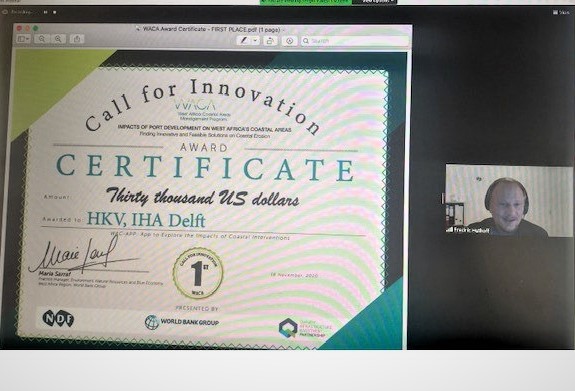Blog |
Jumpstarting Innovation for Coastal Resilience in West Africa
“We need to find new ways to stop coastal erosion and should not be afraid to call for help".
Imagine an App that helps you decide what coastal intervention can help your town, your community, stay above water. That’s the kind of simple invention showcased at the first Call for Innovation organized by the World Bank under the West Africa Coastal Areas Management (WACA) Program.
Coastal degradation causes 13,000 deaths per year in just four of West African countries (predominantly due to floods, air and water pollution), based on 2017 data. Challenging the status quo is justified, and that is what the Call for Innovation was about. Solutions were sought to prevent coastal degradation caused by commercial ports, including the deployment of infrastructures, management of ports and lagoons’ natural environment, and mainstream public and private investments in sustainable ports. Because, if no action is taken, the coast will continue to degrade due to unsustainably built infrastructure coupled with other man-made pressures, and exacerbated by the impacts of climate change.
“Accessing knowledge and solutions isn’t that easy, let alone accessing innovation,” said Benoit Bosquet, World Bank Director for East Asia and Pacific and Chair of the Jury. “We need to find new ways to stop coastal erosion and should not be afraid to call for help. That is exactly what this Call for Innovation is doing, in response to the monumental challenge of coastal degradation in West Africa.”
Held virtually on November 18, 2020, the Demo-Day brought together representatives of academia, government, the private sector, and development agencies, connecting from 27 countries to find out the resutls of the WACA Call for Innovation. The three winners received monetary awards to further develop their proposals into operational concepts. The WACA Program will continue to maximize opportunities for implementation, adoption, and impact by matching innovators with existing activities, development partners, and private sector investors.
The Ports Management Association of West and Central Africa (PMAWCA) has committed to improving the sustainability of its ports. Steps includes better planning and more consideration of the ports’ environmental impact, which is a significant factor in coastal erosion.
“The time is perfect for crowdsourcing and leveraging technology solutions that tackle coastal erosion associated with ports design and operations,” said Jean Marie Koffi, Secretary General, PMAWCA. “We have to be better at managing erosion, waste management and carbon emission from our ports operations.”
The Call for Innovation is a reflection of WACA’s catalytic role. It provides a convening platform where partners can experiment with new approaches, attract finance, and deepen dialogue on real development challenges.
“It has not always been easy to get the private sector to contribute to resilience,” said Simeon Ehui, World Bank Director, West Africa Sustainable Development. “But we must find the sweet spots where private investors understand why these investments make sense, stay profitable and can create jobs.”
Launched in February 2020, the Call for Innovation received 22 proposals. Twelve were longlisted using specific ranking criteria, then five were shortlisted by a panel of World Bank experts in coastal geomorphology; innovation and business planning; PPPs and contracting options; environmental impact; and socioeconomic impact. A high-level Jury representing the private sector, West African port industry, international experts, and development partners selected the top three winners.
HKV-IHE Delft, known as sustainable knowledge entrepreneurs, won the first prize with the WAC-App, an open-access, interactive online application offering insight on the effects of coastal interventions. WAC-App provides clear visualization of the impact of ports and other coastal infrastructures and supports decision-making using different spatial and temporal scales. WAC-App can be used by anyone, with or without a scientific background, facilitating exchange and collaboration between technical experts and stakeholders.
The second prize went to the Egis, Deltares, Finance-For-Impact consortium for a transnational sand bypass that reduces erosion and ports sedimentation and subsequently, restores sand balance. Scalable to multiple West African seaports, this cross-border technology leverages regional cooperation between countries and ports and is funded through a public-private fund pooling resources. As dredging costs are shared, about 15 to 20% cost savings can be passed on to the individual port authorities through the proposed solution, and potentially reach one-third cost savings over the life of the project. Additional co-benefits include community involvement in the project, natural habitat restoration and sustainable knowledge transfer.
Witteveen + Bos, third-place winner, proposed a systematic integrated approach promoting the participation of all stakeholders in developing solutions. The concept, which is based on the principle of developing sustainable ports with net positive value, requires a paradigm shift. Solutions must move from a conventional, economic and engineering oriented approach to one that is inclusive, considering economic, environmental and social impacts. It is based on five steps: identify the problems caused by ports; define the root causes; investigate values and benefits that are under threat, lost and to be developed; develop technical and non-technical solutions; and finally assess the different remedies and select viable, bearable and equitable solutions widely supported by all.
“This Call for innovation is important to us, as we seek solutions to coastal erosion,” said Professor Ochou, Project Coordinator, WACA Cote d’Ivoire. “We often have a fragmented approach to technical advice and are not always sure that the solution we have in mind capitalizes on lessons learned and new technologies.”
The Call for Innovation was funded by the Nordic Development Fund (NDF) and the Quality Infrastructure Investment (QII) Partnership, housed in the Infrastructure Finance, PPPs & Guarantees (IPG GP) and funded by Japan.
